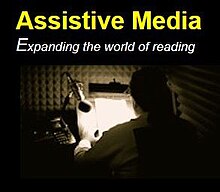Assistive Media
Assistive Media, Inc. is a nonprofit Internet-based reading service to serve people with visual and reading impairments.[1]

Assistive Media was founded in Ann Arbor, Michigan, in 1996 by David Erdody as a 501(c)(3) nonprofit organization.[2][3] According to Erdody, it was inspired by his father's diagnosis of diabetic retinopathy, an avid reader of The New Yorker magazine and audiobooks.[1][4] He considers Duvall Hecht's Books on Tape (company) and the narration style of Grover Gardner to have had a major influence on his admiration and respect for the audiobook format [1] . Utilizing volunteer readers and work-study students from the University of Michigan,[2][3] Assistive Media began producing and distributing spoken-word recordings of otherwise inaccessible materials on audio cassette to participating libraries of the National Library Service for the Blind and Physically Handicapped, a program of the Library of Congress.[3]
In 1998, with the advent of online digital audio formats such as RealAudio, direct distribution of recordings shifted to the Assistive Media website and has received praise from the online disabled community and also from David McCullough, Mark Cuban, and John Perry Barlow.[4][5] In 1999, Assistive Media won RealNetworks, Inc.'s Progressive Streamers Award as the best nonprofit web site of the year.[1][6]
Assistive Media has produced spoken-word recordings of works of nonfiction literature and long-form journalism from The Atlantic, Granta, Harper's Magazine, The New York Review of Books, The New Yorker, Scientific American, and Wired.[4] It is considered one of the longest continuously running Internet-based nonprofit services. In 2011, Assistive Media began recording unabridged nonfiction books for online delivery to libraries that specifically serve people with visual/reading disabilities.
References
- ^ a b c "Disabilities: On-line readings". Detroit Free Press. June 4, 1999. Retrieved April 20, 2018 – via Newspapers.com
 .
. {{cite news}}: Cite has empty unknown parameter:|dead-url=(help) - ^ a b Nesbit, Joanne (June 1, 2004). "Spotlight: The gift of sound". The University Record Online. University of Michigan. Retrieved April 20, 2018.
{{cite news}}: Cite has empty unknown parameter:|dead-url=(help) - ^ a b c "About us". Assistive Media. Retrieved April 20, 2018.
{{cite web}}: Cite has empty unknown parameter:|dead-url=(help) - ^ a b c Clausing, Jeri (June 30, 1998). "New Media Helps Visually Impaired Hear Old Media". The New York Times. Retrieved April 20, 2018.
{{cite news}}: Cite has empty unknown parameter:|dead-url=(help) - ^ Kaplan, Karen (February 1, 1999). "A Web of Dumb Laws and Paper Clips". Los Angeles Times. Retrieved April 20, 2018 – via Newspapers.com
 .
. {{cite news}}: Cite has empty unknown parameter:|dead-url=(help) - ^ "Record-Setting RealNetworks Conference & Exhibition '99" (Press release). Seattle: RealNetworks. May 17, 1999. Archived from the original on June 9, 2002.
External links
- Official website
- Assistive Media on Charity Vault
